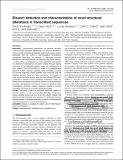Dissect: detection and characterization of novel structural alterations in transcribed sequences
Author(s)
Yorukoglu, Deniz; Hac, Faraz; Swanson, Lucas; Collins, Colin C.; Birol, Inanc; Sahinalp, S. Cenk; ... Show more Show less
DownloadYorukoglu-2012-detection and characterization of novel structural alterations.pdf (402.3Kb)
PUBLISHER_CC
Publisher with Creative Commons License
Creative Commons Attribution
Terms of use
Metadata
Show full item recordAbstract
Motivation: Computational identification of genomic structural variants via high-throughput sequencing is an important problem for which a number of highly sophisticated solutions have been recently developed. With the advent of high-throughput transcriptome sequencing (RNA-Seq), the problem of identifying structural alterations in the transcriptome is now attracting significant attention.
In this article, we introduce two novel algorithmic formulations for identifying transcriptomic structural variants through aligning transcripts to the reference genome under the consideration of such variation. The first formulation is based on a nucleotide-level alignment model; a second, potentially faster formulation is based on chaining fragments shared between each transcript and the reference genome. Based on these formulations, we introduce a novel transcriptome-to-genome alignment tool, Dissect (DIScovery of Structural Alteration Event Containing Transcripts), which can identify and characterize transcriptomic events such as duplications, inversions, rearrangements and fusions. Dissect is suitable for whole transcriptome structural variation discovery problems involving sufficiently long reads or accurately assembled contigs.
Results: We tested Dissect on simulated transcripts altered via structural events, as well as assembled RNA-Seq contigs from human prostate cancer cell line C4-2. Our results indicate that Dissect has high sensitivity and specificity in identifying structural alteration events in simulated transcripts as well as uncovering novel structural alterations in cancer transcriptomes.
Date issued
2012Department
Massachusetts Institute of Technology. Computer Science and Artificial Intelligence Laboratory; Massachusetts Institute of Technology. Department of Electrical Engineering and Computer ScienceJournal
Bioinformatics
Publisher
Oxford University Press
Citation
Yorukoglu, D. et al. “Dissect: Detection and Characterization of Novel Structural Alterations in Transcribed Sequences.” Bioinformatics 28.12 (2012): i179–i187.
Version: Final published version
ISSN
1367-4803
1460-2059